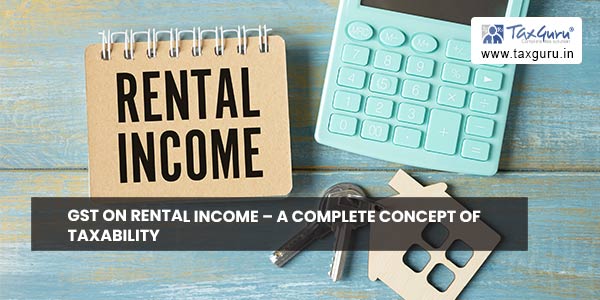With the recent 47th GST Council meet and a lot of notification issued by CBIC, one of the major topic of discussion is GST on “Rental Income”.
As per Schedule II of CGST Act,2017 :-
Land and Building
(a) Any lease, tenancy, easement, license to occupy land is supply of service.
(b) Any lease or letting out of the building including a commercial, industrial, or residential complex for business or commerce, either wholly or partly, is a supply of service.
Rental income generated by way of letting out of any building for commercial or residential purpose is classifiable as supply of service under GST.
(A) Impact of GST on rental income generated from let out of any commercial property for commercial purpose: –
There are 4 scenarios in each case:-
1. When the landlord is registered under GST and tenant too.
S.No. Landlord Tenant
Both are GST Registered Needs to collect the gst from the tenant under Forward Charge @ of 18% may claim ITC on the gst paid on rent if the entire conditions of S-16(4) is complied with and the same is not blocked by S-17(5) of the CGST Act,2017.
2. When only the landlord is registered under GST .
S.No. Landlord Tenant
Only the landlord is registered under GST Needs to collect the gst from the tenant under Forward Charge @ of 18% Cannot claim any ITC on the gst paid on rent as he is not registered.
3. When the landlord is NOT registered under GST, but the tenant is Registered under GST .
S.No. Landlord Tenant
Only the tenant is registered under GST GST Not applicable. Neither liability to pay gst under RCM nor can claim any ITC.
4. When the landlord is NOT registered under GST and the tenant too.
S.No. Landlord Tenant
Both are unregistered under GST GST Not applicable. GST Not applicable.
(B) Impact of GST on rental income generated from let out of any residential property for commercial purpose: –
5. When the landlord is registered under GST and tenant too.
S.No. Landlord Tenant
Both are GST Registered No Needs to collect the gst from the tenant. Will discharge the GST @ 18% under RCM and can claim ITC on the gst paid on rent if the entire conditions of S-16(4) is complied with and the same is not blocked by S-17(5) of the CGST Act,2017.
6. When only the landlord is registered under GST.
S.No. Landlord Tenant
Only the landlord is registered under GST Needs to collect the gst from the tenant under Forward Charge @ of 18% Cannot claim any ITC on the gst paid on rent as he is not registered.
7. When the landlord is NOT registered under GST, but the tenant is Registered under GST .
S.No. Landlord Tenant
Only the tenant is registered under GST GST Not applicable. Liability to pay gst under RCM @ 18% and can claim ITC.
8. When the landlord is NOT registered under GST and the tenant too.
S.No. Landlord Tenant
Both are unregistered under GST GST Not applicable. GST Not applicable.
(C) Impact of GST on rental income generated from let out of any residential property for residential purpose: –
9. When the landlord is registered under GST and tenant too.
S.No. Landlord Tenant
Both are GST Registered No Needs to collect the gst from the tenant. Liability to pay gst under RCM @ 18% and cannot claim ITC as it is used for residential (personal) purpose.
10. When only the landlord is registered under GST.
S.No. Landlord Tenant Only the landlord is registered under GST No need to collect the gst from the tenant as exempt supply under notification 12/2017. GST not applicable.

11. When the landlord is NOT registered under GST, but the tenant is Registered under GST .
S.No. Landlord Tenant
Only the tenant is registered under GST GST Not applicable. Liability to pay gst under RCM @ 18% and cannot claim ITC as it is used for residential (personal) purpose.
12. When the landlord is NOT registered under GST and the tenant too.
S.No. Landlord Tenant
Both are unregistered under GST GST Not applicable. GST Not applicable.
Key Points :-
(a) Commercial property cannot be used for residential purpose.
(b) If the aggregate turnover form the supply of goods and services of the landlord does not exceed the threshold limit of Rs. 20.00 lakhs during the year (Rs. 10.00 lakhs in the special category of states), then there is no requirement of registration under GST.
(c) Irrespective of the threshold limit of registration, if the tenant is liable to discharge the GST under RCM, then he will be liable to be registered under GST and all the provisions of GST will be applicable to him as if he is the supplier of service under GST.
CONCLUSION: –
Thus, the rental income generated from any property, especially the residential property from 18/07/2022 requires due adherence and attention for timely discharge of liability and availment of ITC by a taxpayer while filling the returns for the month of july-2022 onwards.
Disclaimer: The contents of this article are for clarification and information purposes only and does not constitute advice or a legal opinion and are personal views of the author. Readers are requested to check and refer to relevant provisions of statute, latest judicial pronouncements, circulars, clarifications etc before acting on the basis of the above write up.
The writer is a direct and indirect tax expert and can be reached on jainakansha1809@gmail.com.





